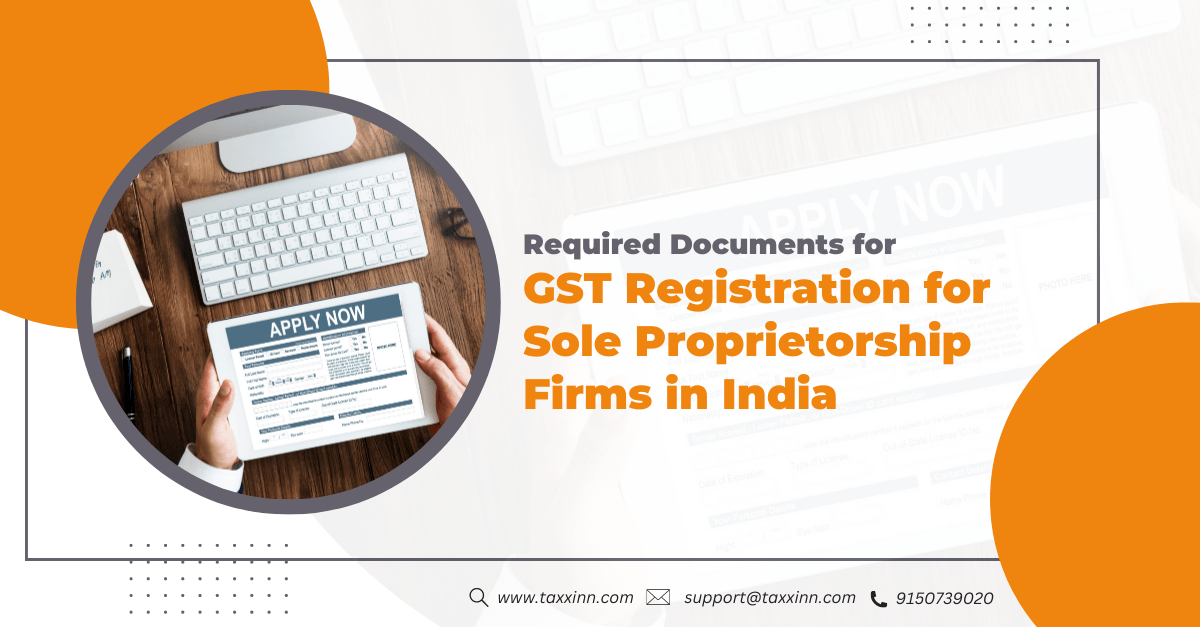Introduction to Sole Proprietorship and GST Registration
In a sole proprietorship, the person who owns it is solely responsible for running the business and is accountable for all its assets, liabilities, and operational decisions. Unlike other business structures, establishing a sole proprietorship typically involves minimal legal formalities and paperwork.
In India, the trade of products and services is subject to the Goods and Services Tax (GST). The GST plays a crucial role in streamlining the indirect taxation system and is a vital component of India’s economic transformation. All businesses, including sole proprietorships, are required to register for GST to operate legally.
Starting a business and fulfilling your duties as a sole proprietorship in India involves going through the process of registering for GST. However, before you can begin the registration process, it’s crucial to obtain the necessary documents. You’ll need accurate evidence to prove your identification, address of residence, business name, and other relevant details. In this article, we will delve into the complete details of the GST registration documents for sole proprietorship in India.
Is GST Registration Mandatory for Sole Proprietorship?
A sole proprietorship firm may need to register for GST based on the following circumstances:
1. When the annual revenue exceeds Rs. 20 lakhs.
2. If the sole proprietorship intends to engage in inter-state business operations, involving the sale of goods or services between different states.
3. When the sole proprietorship entity wishes to claim the input tax credit for purchases made.
Documents Required for GST Registration
The GST registration documents for sole proprietorship in India include:
- A photocopy of the proprietor’s PAN card.
- A photocopy of the proprietor’s Aadhar card.
- Bills for water, electricity, or telephone for the business location, along with the rental agreement if the office is rented or the sale deed if it’s owned.
- Personal bank statements, cancelled checks, or front-page copies of the proprietor’s passbook. If you have a current bank account under the firm’s name, it’s better to submit that instead of a personal bank account.
- A passport-sized photograph of the proprietor.
Procedure to Obtain GST
To obtain GST registration for a sole proprietorship in India, you need to follow these steps:
- Visit the GST website: Go to the official GST website at https://www.gst.gov.in/ and click on the “Register Now” button.
- Fill in the necessary details: Provide the proprietor’s name, PAN, phone number, email address, state, and other essential information.
- Get the OTP: You’ll receive a One-Time Password (OTP) on your registered email address and mobile number. Enter the OTP to verify your identity.
- Submit the required documents: Upload documents such as PAN card, Aadhaar card, business address verification, bank account details, and a photograph of the proprietor.
- Await approval: Once you’ve submitted your application, wait for the GST officer to review and approve it. The approval process can take anywhere from a few days to a few weeks.
- Obtain GSTIN: After your application is approved, you’ll receive a GST certificate along with your Goods and Services Tax Identification Number (GSTIN).
Remember, sole proprietorships must register for GST if their annual turnover exceeds Rs. 20 lakhs (Rs. 10 lakhs for states falling under a specific category). If you need assistance with the GST registration process, it’s advisable to seek help from a qualified accountant or legal professional.
Benefits Associated with GST Registration for a Proprietorship in India
Acquiring GST registration offers several benefits for a sole proprietorship firm, including:
- Legality and Compliance: GST registration allows a proprietorship firm to operate its business legally, showcasing its legitimacy. It ensures compliance with tax laws and instils confidence in clients and partners.
- Input Tax Credit (ITC): Businesses that are registered can avail of Input Tax Credit, which enables them to offset the GST paid on inputs against the GST paid on output supplies. This reduces the overall tax burden and improves cash flow.
- Economic Advantage: GST registration provides a competitive edge to proprietorship firms, allowing them to participate in the mainstream economy. Registered enterprises can seize government contracts, attract more customers, and expand their market reach.
Conclusion
To conclude, the documentation required for GST registration for a sole proprietorship in India establishes a solid and lawful foundation for your company. Once registered and issued a unique Goods and Services Tax Identification Number (GSTIN), your proprietorship firm can operate legally. Registering for GST not only helps you comply with the law but also offers numerous benefits and paves the way for business expansion in a highly competitive market. At Taxxinn, we guarantee a smooth GST registration process without any unnecessary obstacles.
Related Reads:
What is GST Composition Scheme? Key Features and Eligibility Rules
Complete List of Legal Requirements Before Starting Your Company.


